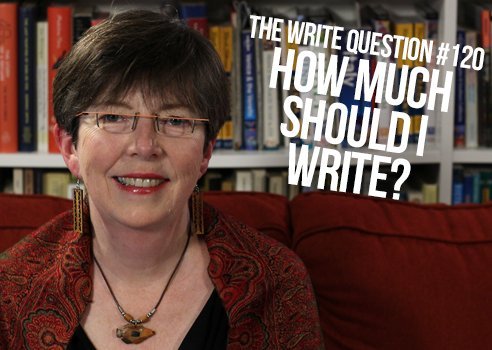Viewing time: 5 mins. 10 secs.
The Write Question is a weekly video podcast about writing that I started in 2017 and that ran, more or less weekly, until April 2022. This is a republication of issue #120, which discusses how many words you should write each day. The post first ran on Dec. 13/19.
Transcript:
How many words should you write each day? That’s the topic I’m addressing today in The Write Question. I’m Daphne Gray-Grant, the Publication Coach.
I have a question from Chris Johnson, a writer based in Fort Wayne, Indiana. Here’s what he’s asked via email:
“I’m working on a book and I’m wondering if you suggest I aim to write X number of words each day? And if that’s the case, how much should X be? Or, do you think it’s better to spend X amount of time writing. And if I do that, how much time should that be? Or do you have some other way of approaching this issue?”
Thanks for your questions, Chris. Many writers benefit from having goals like this — either word count or amount of time. But the goal is going to be very different for every individual. There is no ‘one size fits all.’
The answer really depends on YOU. Not on what I tell you to do. Consider the history of some other famous authors. For example, did you know that Ernest Hemingway always tried to write 500 words a day? Mark Twain on the other hand aimed at 1400 words. Vampire Chronicles writer Ann Rice aims at 3,000 words per day. And the late prolific Michael Creighton, author of Jurassic Park and The Andromeda Strain accomplished 10,000 words per day. Below, I include a link to a blog post outlining the daily word counts of 39 famous authors.
Notice the huge variation. The issue is like height or head size or arm length. Some of us are born writing quickly and the rest of us are born writing relatively slowly. In fact, the speed doesn’t matter.
But yes, set yourself a goal. Just make sure it’s a really easy goal? Why? Because you want to be sure you succeed.
Let me tell you a story. When I wrote my most recent book, Your Happy First Draft, (see link below) I had a daily goal of writing 500 words and I did in 30 minutes a day. Once I finished my rough draft and spent many months editing it, however, I realized I still needed to write two more chapters. But I hadn’t done any writing on the book for more than six months. So, guess what? I’d lost my conditioning.
I tried to write 500 new words per day at this point, and I just couldn’t do it. As a result, I procrastinated about writing, something I hadn’t done in years. I took a look at my situation and decided on a radical solution. I cut my word count goal in half. Instead of aiming to write 500 words, I only had to write 250 I decided. All of a sudden, writing became easy again and my procrastination disappeared, pop!, like a soap bubble.
Many people think that they will be happy if they write a good number of words each day. But, actually, the system works in reverse. When you’re happy, you’ll be able to write more. I’ve written a blog post on this subject and I include the link below.
So, do some basic arithmetic before you get started. A typical book is somewhere between 70,000 and 80,000 words. If you write just 300 words per day – the length of a medium-sized email — just five days a week, you’ll have 70,000 words in 46 weeks. That’s less than a year! Did you ever imagine you’d be able to write an entire book in that amount of time?
So, Chris, I guess my answer to your question is ‘yes.’ Do set a word count goal for yourself. Do give yourself a specific amount of time to do the writing in and make both of those goals very easy. The most important thing is to show up, day after day, and write a little bit at a time. Three hundred words is plenty. And a smaller word count is also okay.
In terms of time, guard against spending TOO MUCH time. That’s a way bigger risk than spending too little. I suggest you start with 15 minutes and gradually work up from there. But don’t allow yourself to exceed 60 minutes because then the job is likely to become too burdensome.
Finally, let me wrap up with a quote from poet Sylvia Plath: “Let me live, love, and say it well in good sentences.”
Chris, notice how Sylvia Plath said nothing about how many words she planned to write per day. Instead, she talked about getting good sentences and, more importantly, writing in harmony with the rest of her life. Writing is a lifelong habit and to keep it that way, you need to make sure your practice is sustainable.
*
If you’d like to learn how to stop procrastinating and make writing a happier more fulfilling process for yourself please take a look at my latest book Your Happy First Draft. I don’t sell it in bookstores or via Amazon. The only place to buy it is on my website, link below.


